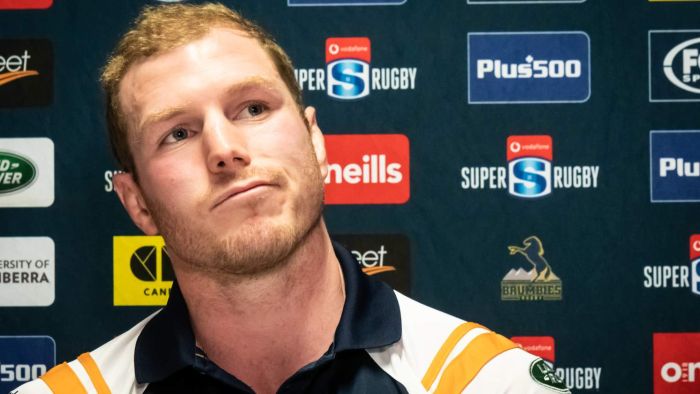Former Australian rugby great David Pocock says the Wallabies Indigenous anthem rendition was a great gesture, but the issue with Advance Australia Fair is not the language it is sung in, but the lyrics themselves.
Key points:
- David Pocock called for stronger leadership on the environment and the national anthem debate
- Pocock said the singing of the Australian national anthem in Eora was a “great gesture”
- Pocock called politicians “morally bankrupt” when it came to action on climate change
Wallabies players sang the Australian national anthem in both Eora language and English ahead of the Tri Nations Test against Argentina at the Western Sydney Stadium last week.
Wiradjuri woman Olivia Fox led the rendition of the national anthem in Eora language, with the Wallabies players noticeably joining in behind her.
The former Brumbies flanker applauded the gesture — the first of its type in a Wallabies Test — but said more could be done.
“In some ways, it’s a great gesture,” the former Wallabies captain said, speaking to Catherine Murphy and Tony Armstrong on ABC Radio Melbourne’s Grand National show on Saturday.
“In other ways I think the anthem is problematic in itself, singing about being young and free when we live on land that’s the oldest living culture in the world — it’s probably important that these are part of the conversation,” he added.
‘Young and free’
The lyrics to Advance Australia Fair have been a point of contention for some Indigenous athletes in recent years.
Some NRL players refused to sing the national anthem ahead of the 2019 State of Origin series.
That came after many of the Indigenous All Stars team remained silent during the season curtain-raiser in Melbourne that year.
The Indigenous All Stars captain Cody Walker and Kangaroos coach Mal Meninga called for a change in the anthem following that game, with Walker saying the anthem “doesn’t represent myself and my family”.
MPs Craig Kelly and Tania Plibersek have since added their voices to those asking for a change, but Pocock said there was more that could be done.
“What I would love to see is leaders who are willing to actually face up to Australia’s history and undertake some more meaningful truth and reconciliation in finding ways to actually move forward together.
“We’ve all got so much more in common.
“The goal is really firstly just trying to understand each other and to acknowledge the wrongs that have been done.”
Politicians ‘morally bankrupt’ on climate change




Pocock, who retired from all forms of rugby earlier this year to focus on his environmental activism, also called for stronger leadership on climate change, labelling Australian politicians’ approach as “morally bankrupt”.
Earlier this week, Prime Minister Scott Morrison maintained the Government’s position that Australia will reach carbon neutrality sometime in the second half of this century, as opposed to committing to net-zero emissions by 2050.
“What matters is … not how many speeches you give, not how much ambition you declare,” the Prime Minister said.
“I may have an ambition to play front row forward for the Wallabies, but that ambition won’t be realised.”
Pocock said that politicians were failing the Australians of the future.
“We are failing Australians, we are failing future generations, and frankly we’re shirking our responsibility as humans,” Pocock said.




“With something like the climate crisis, we’re leaving it to school kids, to have to stand up and demand that their futures be considered.”
Pocock has long been a climate activist.
He was arrested in 2014 after chaining himself to a digger at the Maules Creek coal mine in northern New South Wales.







